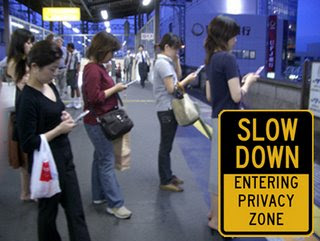out/in off/on

Do inhabitants of the new city need physical boundaries to delineate their privacy? Reading, sms-ing, ipod-ing, vpoding, or using any kind of mobile device are visible activities that may communicate to others: “I’m not currently available for any approach or talk”.more
As "symbolic bodyguards" (Lasen 2002b:27), mobile phones also contribute to the strategy of individuals to defend a minimal private space and the right to enjoy “civil inattention” [6] within areas densely populated with - potentially intruding and irritating - unknown strangers (Haddon 2000; Cooper 2000).
BRIEF
Psychogeography is the study of the collective 'inside' (philosophy, cultural values, politics and religion) and how it is reflected on the 'outside'(symbols, monuments, architechture, urban planning.) This workshop/action explores how mobile technology has effected the social behavior of crowds and individuals in public and their definition of privacy.
ACTION
Performers hold customized signs as they locate private/public space.
First the group will split in trios and go on a 1 hour dérive.
INSTRUCTIONS
Visualize a city area referencing symbols, emotion, ideas, geography. Make diagrams of an urban space locating each area on a continuum of private and public. (Diagrams will be made into flash animations and keyed into video for the video installation. The installation consists of 5 placards 'you are where' mimicking the 'you are here' maps in parks. Image, animations and video will be projected onto the placards.)
PROPS
- customized mental or hard board traffic signs/wands with included text:
'Private Distractor', 'Urban Attractor', 'Invasion of Public', 'Privacy Zone', 'Semi-Public Zone' - global positioning system devices
- digital camera/camcorder

RESOURCES
Urban Atmospheres
Vietnamese Architecture

The city creates a kind of uneasiness because the experience typical of pubic transport systems is that they split the visual field from the auditory field. People are constantly placed "in a position of having to look at one another for long minutes or even hours without speaking to one another. (Benjamin 1973: 38)'. Benjamin read the city as if it were a rune or a hieroglyph.
